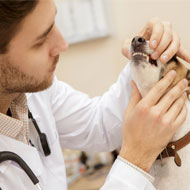WSAVA launches first global veterinary dentistry guidelines

The Guidelines include recommendations for oral examinations.
The World Small Animal Veterinary Association (WSAVA) has launched the first Global Guidelines for veterinary dentistry. The Guidelines will support vets across the world in improving recognition of dental disease and giving patients better dental care.
Besides improving current standards of care, the WSAVA hopes the Guidelines will bridge a significant gap in veterinary education. It also hopes they will highlight the importance of dentistry in the curriculum.
Launched on Sunday (24 September), the WSAVA’s Global Dental Guidelines include information and images of oral anatomy and common pathology. They also include recommendations for oral examinations and a dental health scoring system.
A key theme is the WSAVA’s rejection of anaesthesia-free dentistry (AFD), which it describes as ‘ineffective’ and a cause of unnecessary stress and suffering.
Developed by WSAVA’s Global Dental Guidelines Committee (DGC), the Guidelines are based on the WSAVA’s continuing education system. This is to ensure they are relevant to all vets, no matter what their level of experience.
"In developing the Global Dental Guidelines, we felt that the lack of perception of patient pain was a key issue,’ commented Dr Brook Niemiec, co-chair of the WSAVA DGC.
"Our Committee members were also unanimous in their opposition to AFD. We believe that anaesthesia is essential for the execution of any useful dental procedure and this is a central recommendation of the Guidelines. To support it, we have provided a detailed analysis of anaesthesia and pain management approaches.”
Dr Niemiec added that patients are not well served by the current variation in standards of care, equipment and dentistry knowledge.
“Misinformation which clouds the sector is a further hindrance,” he said. “As clinicians, we cannot allow a fear of the unknown, the discomfort of client pushback or ignorance of current techniques to keep us from doing our best to relieve pain and suffering in our patients.”
The guidelines are free to download from WSAVA’s website.



 The Veterinary Medicines Directorate (VMD) is inviting applications from veterinary students to attend a one-week extramural studies (EMS) placement in July 2026.
The Veterinary Medicines Directorate (VMD) is inviting applications from veterinary students to attend a one-week extramural studies (EMS) placement in July 2026.